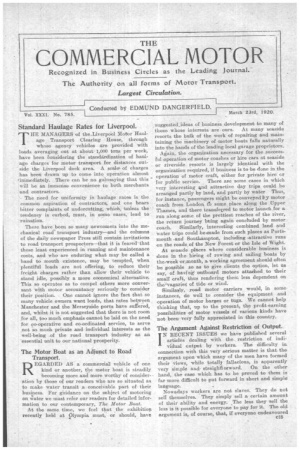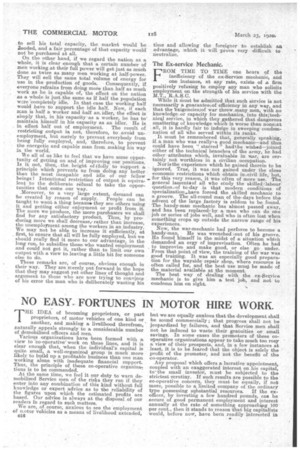Standard Haulage Rates for Liverpool.
Page 1

Page 2

If you've noticed an error in this article please click here to report it so we can fix it.
THE MANAGERS of the,Liverpool Motor Haulage Transport Clearing House, through whose agency vehicles are provided with loads averaging out at about 1,000 tons per week, have been Considering the standardization of haulage charges for motor transport for distances outside the Liverpool dock area. A scale, of charges has been drawn up to come into operation almost *immediately. There can be no gainsaying that this will be an. immense convenience to both merchants and contractors.
., The need for uniformity in haulage. rates is the common aspiration of contractors, and one hears bitter complaints of undercutting, which, Unless the tendency is curbed, must, in some cases, lead to 'ruination.
• There have been so many newcomers into the mechanical road. transport industry—and the columns of the daily newspaper Press still contain invitations to road transport prospectors—that it is feared' that those least experienced in running and maintenance costs, and who are enduring what may be called a hand to mouth existence, may be tempted, when plentiful loads are not .offering, to reduce their freight charges rather than allow their vehicle to stand idle, possibly a more economical alternative. This .so operates as to compel others more conversant with motor accountancy seriously to consider their position. One cannot ignore the fact that so many vehicle owners want loads, that rates between Manchester and the Merseyside ports have suffered, and, whilst it is not suggested that there is not room for all, too much emphasis cannot be laid on the need for co-operative and co-ordinated service, to serve not so much private and individual interests as the well-being of the road transport industry as an essential unit to our national prosperity.
The Motor Boat as an Adjunct to Road Transport.
REGARDED AS a commercial vehiele of one kind or another, the motor boat is steadily becoming more and more worthy of consideration by those of our readers who are so situated as to make water transit a , conceivable part of their business. For guidance on the subject of motoring on water we must refer our readers for detailed infornaation to our contemporary, The Motor Boat. At the same time, we feel that the exhibition recently held at Olympia must, or should, have suggested,ideas of business development to many of those whose interests are ours. At many seaside resorts the bulk of the work of repairing and maintaining the Machinery of motor boats falls naturally into the hands of the leading local garage proprietors. Again, the organization. necessary for the successful operation of motor coaches or hire cars at seaside or riverside resorts is largely identical with the organization required, if business is to be done in the operation of motor craft, either for private hire er for public service. There ape some cases in which very interesting and attractive day trips could be arranged partly by land, and partly by water Thus, for instance, passengers might be conveyed by motor coach from London tt some place along the Upper Thames, and there tranafetred to motor launch for a run along some of the prettiest reaches of the river, the return journey bting again conchided by motor coach. Similarly, interesting combined land and water trips could bemaade from such places as Portsmouth and Southampton, including attractive runs on the roads. of the New Forest or the Isle of Wight. At seaside places where considerable business is done in the hiring of rowing and sailing boats by the-week er..month, a working agreement should often be possible so as to give clients the option, let us say, of ha:vine 'outboard motors attached to their small craft, thus rendering them less dependent on the vagariet of tide or wind. Similar/1y, yossrl motor carriers would, in some instances, do well to consider' the equipment and operation of motor barges or tugs. We cannot help thinking that, up to the present, the profit-earning possibilities of motor vessels of various kinds have not been very fully appreciated in this country.
The Argument Against Restriction of Output.. IN RECENT ISSUES we have published several articles dealing with the restriction of individual eutpot by workers. The difficulty in connection with this very serious matter is that. the argument upon which many of the men have formed their views, -while totally fallacious, is apparently very simple andstraights orward. On the other hand, the ease which has to be proved to them is far more difficult to put forward in short and simples language. .. Nowadays workers are not slaves. They do not • sellthemselves. They simply sell a certain amount of their' ability and energy. The less they sell. the less is it possible for everyone to pay for it. The old argument is, of course, that, if everyone endeavoured
to sell his total capacity, the market would be aooded, and a fair percentage of that capacity would' not be purchased at all.
On the other hand, if we regard the nation as a whole, it is clear enough that a certain number of men working at their full power will get just as much done as twice as many men working at half-power. They will eel the same total volume of energy for use in the production of goods. Consequently, if everyone refrains from doing more than half as much work as he is capable of, the effect on the nation as a whole is just the same as if half the population were 'completely idle. In that case the working half would have to support the idle half. Now, if each man is half a worker and half an.idler, the effect is simply that, in his capacity as a workers he has to maintain himself in his capacity as an idler. He is in effect half out of employment. The result of restricting output ia not, therefore, to avoid unemployment, but meaely to prevent everybody from being fully employed, and, therefore, to prevent the energetic and capable an from making his way in the world.
Re all of us like to feel that• we have some opportunity of getting on and of improving. our positions. Is it not, then, . the height °Welly to support a principle which prevents us from doing any 'better than the most incapable and idle of our fellow beings ? Intentional restriction of output is equivakat to the deliberate refusal to take the opportunities that come our way. _Moreover, to a very large extent, demand can be created by reason of supply. People can be taught to want a thing because they see others using it and getting either enjoyment or profit from it. The more we produce the more purchasers we shall find for any satisfactory product. Thus, by producing more we shall decrease,rather than increase, the unemployment among the workers in an industry. We may not be able to increase it sufficiently, at first, to ensure that all will be fully employed, but we should really find it more to our advantage, in the long run, to subsidize those. who wanted employment and could not .get it, rather than to limit our own output with a, view to leaving A little bit for someone else to do.
These remarks are, of course, obvious enough in their way. They are merely put forward in the hope that they may suggest yet other lines of thought and argument to those who are now trying to convince of his error the man who is deliberately wasting his time and allowing the foreigner to establish an advantage, :which it will. ;prove very difficult to neutralize.
The Ex-service Mechanic.
FROM TIME TO TIME one hears of the inefficiency of the ex-Service mechanic, and one instance, at any 'rate, exists of a firm positively refusing to employ any man who solicits employment on the strength of his service with the M.T., R.A. S.C.
While it Must be admitted that such service is not necessarily a guaranteeiof efficiency in any way, and that the 'exigencies of war threw many men, with no
knowledge, or capacity for mechanics, into thisttechnic4 service, in which they gathered that dangerous
smattering of knowledge which is worse than none;at all, it is hardly fair to indulge in sweeping condemnation of all who served within its ranks.
It must be remembered that, generally speaking, if a man Who was reallyaa good mechanic—and thus. could have been " starred ' hadshe wished—joined either of the technical branches of the army, he had other-attributes which, invaluable in war; are certainly not worthless in a civilian occupation.
Noristhe experience which he gained therein to be ignored. Truel it was-not gained, under the close
economic restrictions which obtain in. civil life, but, for this very reason, it was often of more use. The general lament*of all who study the skilled4labour question:of to-day is that modern conditions of
specializatio_nahave forced the skilled mechanic to a groove. The all-round man of the days before the
advent of the large factory is seldom to be found.
The handy-man mechanic has almost passed away, and has been replaced, by a man who can do one
• job or series of jobs well, and who is often lost when something crops up outside the narrow range of his experiences. Now, the war-mechanic had perforce to become a handy-man. He was wrenched ;out of his groove. He found himself in the midst of a situation which demanded an orgy of improvisation. Often he had , to improvise and make good, or else go under. From that paint of view, the training of the war was good training. It was an especially good preparation for the waysiderepair shop, where resource is often called for, and the best use must be made of the material available at the moment.
The best way of dealing with the ex-Seavices • mechanic is to give him a. test job, and not to condemn him on sight. •


























